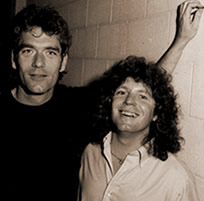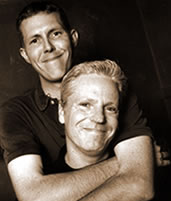 |
 |
 |
|||||||
A Conversation with Billy Block (continued)
PM: It's amazing to me how much you've accomplished here since 1995. With all that went down in Houston or in L.A., it seems even much more so here. Is that not so?
BB: Yeah, it's been pretty intense. I quit music for the first year I was here. Western Beat took a break for a year. I went to work for David thinking I was going to get into the Music Business.
PM: You thought you might become a publisher, for instance?
BB: I thought that I was going to take over the magazine. Or become a partner, or whatever he wanted me to do. It was a great place to start in Nashville, because Music Row Magazine is the epicenter of the industry. All the information about everything comes through that office. Consider the time of my arrival, 1995. Garth was going crazy. Country was at its zenith. Parties every week, I met Everybody. I became the account executive to all the publishers, all the studios, all the labels. Working there put me on the fast track into the very heart of Nashville. Six months into my tenure at Music Row, I got a call from Woody Bomar to start doing some sessions with John Scott Sherrill.
PM: He was still Little Big Town Music at the time? [very successful small publisher that later folded into a bigger one, and probably a bigger one after that]
BB: Right. So I would moonlight, doing sessions with people like John Scott Sherrill, at night. It was a great thing. And about a year after we arrived, I believe in February, we began Western Beat in Nashville. It all started with a call to Duane Jarvis. I'd moved on from Music Row, and was wondering what I was going to do. It was the beginning of the whole Americana thing [the name of the radio chart for the Folk Pop or Alternative Country movement], and I was going to go to work for Gavin as the Director of Sales and Marketing for Country and Americana. So, I was moving from a prominent Nashville magazine to a national publication.
In the process of doing all that, I called Duane Jarvis and said, "Let's do a Barn Dance," and that's what we called it at the beginning. We got some friends together. Jim Lauderdale, who'd played on the first Western Beat show in L.A., played on the first one in Nashville. Kristi Rose was on that show. Walter Hyatt was on that show. It was a pretty phenomenal night. I think we just did four acts, those three and Duane Jarvis, I think.
PM: And what was the venue?
BB: The Sutler. [a pretty humble neighborhood honky tonk next to a bowling alley, long a small venue in town] It was rockin from day one. It was packed.
PM: Did it have a house band from the top?
BB: Oh yeah, the same bunch of players. Red Volkaert on guitar, Robin Ruddy on steel, Lorin Raul on bass, and Dallis Craft on keys. I asked Johnny for his worst night, and said let's try it for a month, see if we can get something going. And it worked right away, and continued to grow. We spent a year at The Sutler, and it got to be "Nobody goes there, it's too crowded," so we moved to Zanies, the comedy club. It was a good vibe and a great room, but it's a comedy club and it sounded a little funny in there.
PM: Oh my.
BB: So we made that work for about a year. Then Ned Horton, who'd gotten us into Zanies, steered us toward the Exit/In. I'm pretty loyal to a point, and sometimes resist change, so I had my doubts at first. Jill insisted I not be afraid to grow, and I did it after some kicking and screaming, and it was the best thing we ever did. The Exit/In proved to be the greatest venue, and I think, in turn, we helped revive the popularity of the club itself.
PM: There's little doubt about that.
BB: So it was a good match.
PM: Did you think at first it might be too big a room? Zanies, after all, wasn't small, either.
BB: Not really, I thought ultimately that it was a natural progression and would appear to show growth. We'd consistently been able to draw hundreds of people every week, and you know how hard it is to get anybody out in Nashville.
PM: It's abominable.
BB: And we've been able to do it for five years now.
PM: That's a lot of Tuesdays.
BB: 50 shows a year, five bands a show.
PM: 1250 bands.
BB: That's a lot of music. And everything's been archived. We've recorded pretty much every show, I have CDs of most everything we've ever done. In the earliest days we didn't record everything. While we were on Lightning [Nashville's biggest Americana friendly station], all that got recorded. The Zanies shows were all for radio. So, somewhere there's a DAT or CD of almost every show we've done. A friend of mine, Kent Henderson, used to work at the Country Hall of Fame. He gave me some sage advice. He said, "Billy, save everything. One day, what you're doing may end up in the Country Hall of Fame." And if someday what we're doing here becomes valuable to Country Music, then good for us. And good for them.
We've been at the Exit/In now for three years. In a word, to me it's about Community. We've been able to build a community of artists and listeners. We've watched artists from all over be able to come through town and plug right into it. When the people who don't fit in anywhere come to town, ASCAP, SESAC, or BMI send them to us. And we give them a place where they feel they can belong. Our show is a place where the innovators can come and be respected, a safe haven for people drawing outside the lines. continue
Print (PDF) Archives Puremusic Home